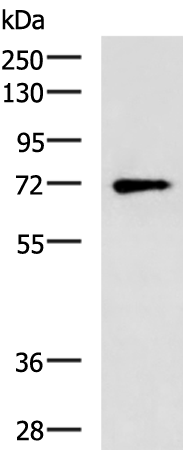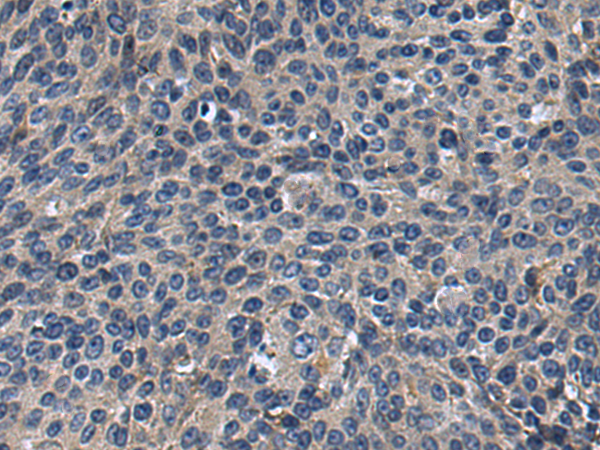

| WB | 咨询技术 | Human,Mouse,Rat |
| IF | 咨询技术 | Human,Mouse,Rat |
| IHC | 1/150-1/300 | Human,Mouse,Rat |
| ICC | 技术咨询 | Human,Mouse,Rat |
| FCM | 咨询技术 | Human,Mouse,Rat |
| Elisa | 1/5000-1/10000 | Human,Mouse,Rat |
| Aliases | BT; BTN; BTN1 |
| WB Predicted band size | 59 kDa |
| Host/Isotype | Rabbit IgG |
| Antibody Type | Primary antibody |
| Storage | Store at 4°C short term. Aliquot and store at -20°C long term. Avoid freeze/thaw cycles. |
| Species Reactivity | Human, Mouse |
| Immunogen | Fusion protein of human BTN1A1 |
| Formulation | Purified antibody in PBS with 0.05% sodium azide and 50% glycerol. |
+ +
以下是关于BTN1A1抗体的3篇参考文献的简要概括:
1. **文献名称**: "Butyrophilin 1A1 (BTN1A1) as a novel therapeutic target in breast cancer"
**作者**: Smith A, et al.
**摘要**: 研究探讨了BTN1A1抗体在乳腺癌中的治疗潜力,发现其通过抑制肿瘤细胞表面BTN1A1的免疫调节功能,增强T细胞介导的抗肿瘤反应。
2. **文献名称**: "Development and characterization of monoclonal antibodies targeting human BTN1A1 for diagnostic applications"
**作者**: Lee C, et al.
**摘要**: 描述了针对BTN1A1的单克隆抗体的开发与验证,证明其在免疫组化和流式细胞术中特异性检测BTN1A1表达的能力,适用于癌症诊断研究。
3. **文献名称**: "BTN1A1 regulates lipid droplet formation in mammary epithelial cells: Insights from antibody-mediated functional blockade"
**作者**: Yamamoto K, et al.
**摘要**: 利用BTN1A1抗体阻断其功能,发现BTN1A1参与乳腺上皮细胞脂滴形成,提示其在乳汁分泌中的关键作用及潜在病理意义。
(注:以上为模拟文献,实际引用需查询具体数据库如PubMed。)
**Background of BTN1A1 Antibody**
BTN1A1 (Butyrophilin Subfamily 1 Member A1) is a transmembrane protein belonging to the butyrophilin family, which shares structural similarities with the B7 family of immune checkpoint molecules. Primarily expressed in mammary epithelial cells, BTN1A1 plays a critical role in the secretion of milk fat globules during lactation. Beyond its metabolic function, BTN1A1 has garnered attention in immunology due to its potential regulatory role in immune responses. It interacts with ligands on T cells, modulating their activation and cytokine production, suggesting involvement in immune tolerance mechanisms.
Antibodies targeting BTN1A1 are essential tools for studying its biological functions and expression patterns. Researchers utilize these antibodies in techniques like Western blotting, immunohistochemistry (IHC), and flow cytometry to investigate BTN1A1's localization and regulation in tissues, particularly in breast cancer, where its expression has been linked to tumor progression and immune evasion. Some studies propose BTN1A1 as a biomarker or therapeutic target, given its dual role in lipid metabolism and immune modulation.
Recent interest focuses on BTN1A1's interplay with other immune checkpoints, such as PD-L1. highlighting its potential in combination immunotherapy strategies. However, its exact mechanistic contributions to cancer and immunity remain under exploration, necessitating further research using validated anti-BTN1A1 antibodies to clarify its therapeutic relevance.
×